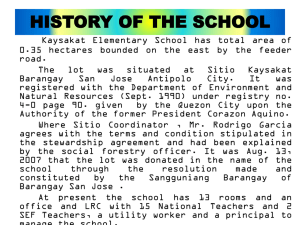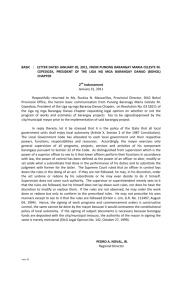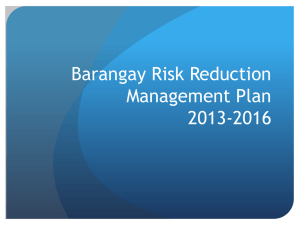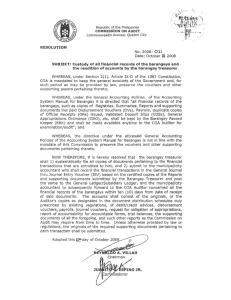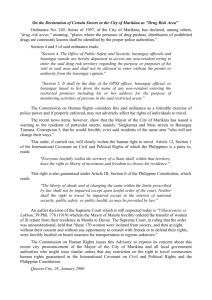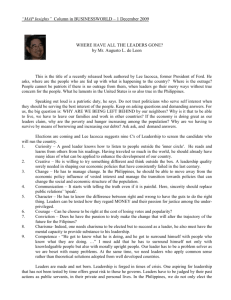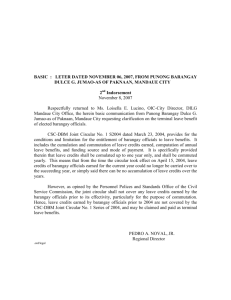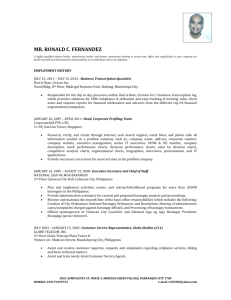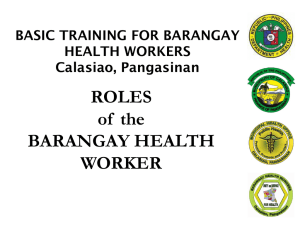ATTY. EDGAR ABESAMIS President LIGA NG MGA BARANGAY SA
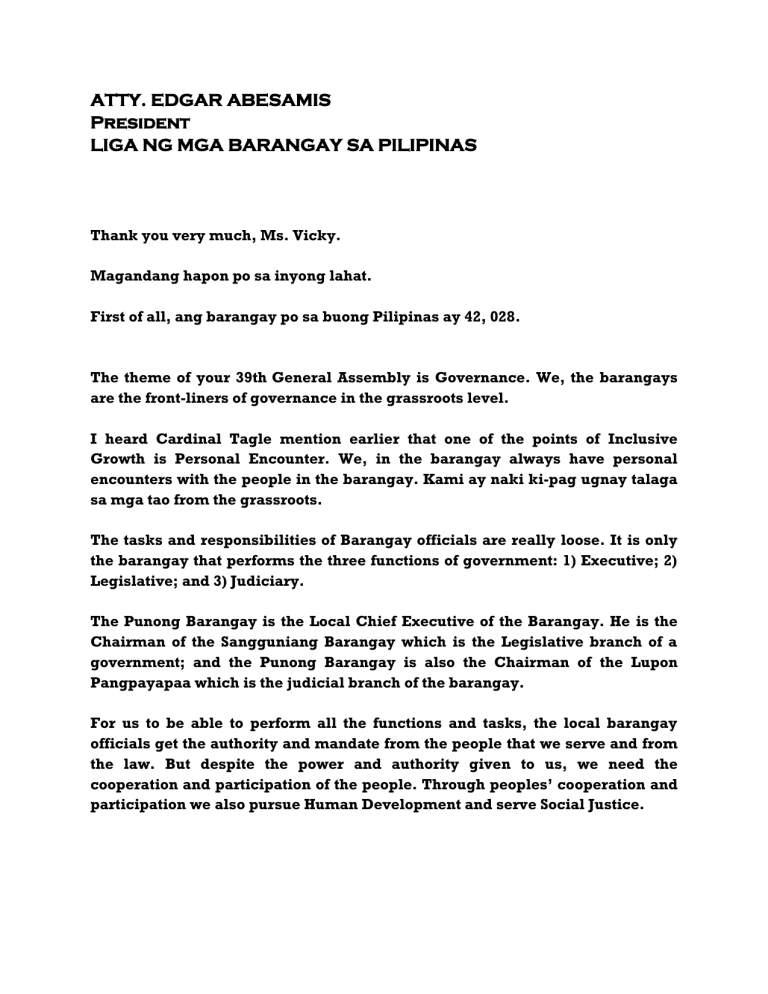
ATTY. EDGAR ABESAMIS
President
LIGA NG MGA BARANGAY SA PILIPINAS
Thank you very much, Ms. Vicky.
Magandang hapon po sa inyong lahat.
First of all, ang barangay po sa buong Pilipinas ay 42, 028.
The theme of your 39th General Assembly is Governance. We, the barangays are the front-liners of governance in the grassroots level.
I heard Cardinal Tagle mention earlier that one of the points of Inclusive
Growth is Personal Encounter. We, in the barangay always have personal encounters with the people in the barangay. Kami ay naki ki-pag ugnay talaga sa mga tao from the grassroots.
The tasks and responsibilities of Barangay officials are really loose. It is only the barangay that performs the three functions of government: 1) Executive; 2)
Legislative; and 3) Judiciary.
The Punong Barangay is the Local Chief Executive of the Barangay. He is the
Chairman of the Sangguniang Barangay which is the Legislative branch of a government; and the Punong Barangay is also the Chairman of the Lupon
Pangpayapaa which is the judicial branch of the barangay.
For us to be able to perform all the functions and tasks, the local barangay officials get the authority and mandate from the people that we serve and from the law. But despite the power and authority given to us, we need the cooperation and participation of the people. Through peoples’ cooperation and participation we also pursue Human Development and serve Social Justice.
Among the pillars of Human Development are 1) Empowerment and 2)
Cooperation. Empowerment is the freedom of the people to influence development and the will of the people and decisions that affect the lives; and
Cooperation that involves the peoples’ participation to communities as a means of mutual enrichment and source of social meaning.
Along this line, a national government’s program of Inclusive Growth entails the Liga ng mga Barangay, which is the organization of all the 42,028 barangays in the Philippines that I head by Atty. Abesamis launched this
Program called UBAS – Ugnayan ng Barangay at Simbahan.
UBAS is a tripartite aggregate among the barangays initiated by the
Department of Interior and Local Government (DILG). UBAS evolved and it now includes all sectors of society and are given the opportunity to participate in dealing with problems and coming out with solutions that affect the lives of trhe various sectors of the community.
It is an engagement on Good Governance, Environmental Protection; Welfare of Children, especially the street children, family and illegal drugs.
It was mentioned earlier that Good Governance is one of the solutions to economic stability and include also the promotion of the welfare of the
Indigenous Peoples (IPS).
Basically, what UBAS is encouraging is Peoples’ Participation and we are doing these on the grassroots level.
One concrete example of UBAS’ engagement on Good Governance is the monitoring of programs and projects under the so-called Bottom-Up Capacity
Program (BUP) of the national government. Under the BUP, the projects and programs are identified by the community together with the local government unit. Once these programs have been identified, the National Government will then provide the funds, that is why it is called the Bottoms-Up Capacity. This however is different from the former arrangement where it is the National
Government that provides the funds and identifies the programs that should be implemented. Kaya kung minsan, hindi kailangan, ibinababa.
The programs that will now be funded will come from the community itself and from the Local Government Unit (LGU).
Under the Bottoms –Up Projects and Programs (BUP), the role of UBAS is to monitor the implementation of the barangay projects and programs. UBAS will ensure that the projects and programs are implemented in accordance with the plans. Sinisiguro lang po natin na ang mga proyekto at program ay maisakatuparan sang-ayon sa plano.
Loopholes are being looked into. This is an engagement wherein cooperation is being put into place so that there will be a realization of the objectives of the programs and projects.
UBAS has its own parochial engagements and handling its own programs and approach. For example in Cebu, Cebu has its own way of handling problems on street children.
At present, we have launched UBAS in 68 out of 81 provinces already, i.e. Cebu,
NCR, Cagayan de Oro, Novaliches and many parts of the country. Nandito po si
Archbishop Ledesma at Bishop Tobias. The presence of UBAS is practically allover now.
The Liga ng mga Barangay is truly thankful for the cooperation and active participation of the Bishops of the Catholic Church - the religious sector. We are also very thankful for the big support given by the DILG headed by Sec.
Mar Roxas.
Minsan po tinatanong kung mayroong violation dun sa separation of Church and State. Ayoko ko sanang i-discuss yung anggulo na ito. I can say that there is no violation in the implementation, trust me, I am a lawyer.
Anyway, there is however a convergence point- that of the common good. But kung may political patronage, that is not for the common good. When we do something for the common good, we reach out for the poor.
So for convergence, there has to be a common good. Pag sinamahan mo ng business yung common good before convergence, lahat ma co-corrupt.
So with these ideas, we have the legal intention of UBAS.
Kaya po, we look at it, we are establishing and creating these Technical
Working Groups (TWG) have been established where UBAS has been launched and we hope that we will be able to get to the level of the Barangay Level which is the Barangay Action Team.
Last Thursday, we organized four (4) Barangay Action Teams in Nueva Ecija and we have trained them already although it was only a one-day seminar, I think we were successful.
So yung po sa business sector to become part of UBAS.
We welcome you. Sama-sama po tayo because UBAS is for all of us.
Let us plant the seeds of UBAS in our hearts because together, our harvest will be abundant and it will feed not us during our watch but the future generation, the people who will come after us.
